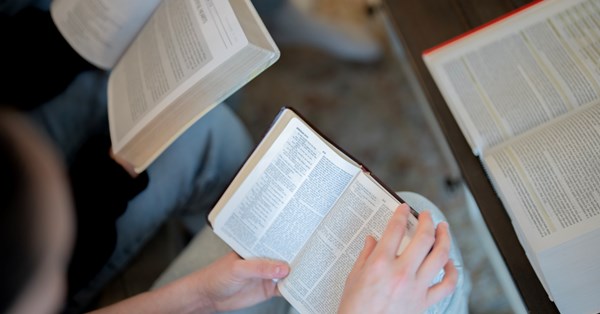MORE than 2000 students across the UK have been asked their opinion of the Bible in a survey commissioned by Fusion, a charity that describes its mission statement as: “Every student should have an opportunity to find hope in Jesus and home in the local church.”
Undergraduates of 186 universities were asked questions by the polling organisation Savanta about their views on the Bible’s contents, their access to a Bible, and their interest in reading it.
In its report, Fusion does not provide a precise definition of “Christian”, and it is unclear whether this is a matter of belief or practice. The “non-Christian” category includes adherents of other faiths, such as Muslim, Hindu, Jewish, and Buddhist students. Those of “no religion” were allocated to a third category.
The students were asked about their childhood exposure to the Bible. Eighty-eight per cent of Christian students said there was a Bible in the household where they grew up. Forty-two per cent of those who identified themselves as “non-Christian” reported having access to a Bible while growing up; the figure was 49 per cent for those defining themselves as of “no religion”.
Twenty-nine per cent of all respondents said that they read the Bible at least weekly. Of the respondents who described themselves as Christian, 56 per cent said that they read the Bible at least weekly, while 12 per cent of non-Christian students did so.
“This was a higher-than-expected number and definitely surprised us,” the report says. “This could be students interacting with Scripture on social media and could be more aspirational than actual.”
Ben Burton, 20, who is in his second year studying theology at New College, at the University of Edinburgh, told the Church Times: “During term time, I try to say morning and evening prayer daily from the Book of Common Prayer. . . maybe every other day that I do that.”
The study, which was undertaken last August and September, suggests that students who describe themselves as “practising Christians” are more inclined to read the Bible in group settings: 32 per cent of “practising Christians” reported that they did, compared with 13 per cent of non-Christian students.
Mr Burton, who participates in religious services weekly, prefers to read the Bible in a group: “If I’m alongside other people and there’s something I don’t understand or I get confused, I can ask. Whereas if I’m reading the Bible by myself and I don’t understand something, I probably just stop for the time being.”
When asked about their motivations for reading the Bible, 29 per cent of non-Christian students surveyed said they did so to “deepen their understanding of faith”. A further 29 per cent said that they were “seeking comfort and reassurance” through reading the Bible.
These numbers increased for the Christian respondents. Sixty-eight per cent said that they did so to “deepen their understanding of faith”, and 55 per cent read the Bible “seeking comfort and reassurance”.
Fifty per cent of the students surveyed agreed that the Bible was relevant to today’s world. This agreement falls to 32 per cent among non-Christian students and 27 per cent among students with no religion.
“It’s a book that has a lot of impact and has had a lot of impact on a lot of people’s lives and has really shaped society,” Mr Burton said. “So I really think that it’s something that people ought to read, even if the religious aspects of it pass one by.”

















